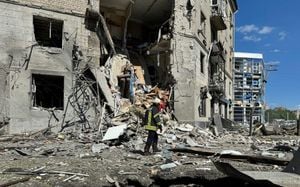The Supreme Court of India has found itself at the forefront of pressing legal matters recently, particularly revolving around education and corruption issues. Two distinct yet significant cases made headlines this week, drawing attention from various sectors of society and legal experts alike.
First up was the high-stakes case surrounding the National Eligibility-cum-Entrance Test for Postgraduate (NEET-PG) 2024. On Tuesday, the Supreme Court postponed the hearing of the petition concerning the transparency of this exam until December 10. A bench comprised of Justices B.R. Gavai and K.V. Viswanathan faced scheduling issues and could not discuss the matter as planned. This postponement has raised eyebrows among students and education advocates who are demanding more accountability from the examination authorities.
The NEET-PG examination, which is pivotal for aspiring medical students, has been criticized for introducing significant changes just days before the test. Candidates expressed concerns over the decision to run the test across two shifts and the subsequent normalization process. Petitioners have insisted these alterations negatively impacted their ability to perform, resulting in unfair disadvantages.
According to the petition, filed by advocate Parul Shukla on behalf of the NEET-PG aspirants, the lack of clarity surrounding the exam process and the refusal to disclose question papers and answer keys has led to serious questions about fairness and governance. The claim suggests the National Board of Examinations (NBE) has operated without transparent protocols, enabling arbitrary changes to the examination structure without due consideration for the affected students.
"The method by which the examination is conducted is manifestly arbitrary and contravenes the principles of transparency as enshrined under Article 14 of the Constitution of India," the petition stated, underscoring the angst felt by thousands of hopeful candidates. The information bulletin, which traditionally guides students, has been called out for lacking clarity and consistency, provoking fears of murky governance.
Another major case captured public interest this week—the bail plea of Partha Chatterjee, the former West Bengal Education Minister embroiled in the notorious cash-for-school-job scam. On Wednesday, the Supreme Court reserved judgment on his request for bail, which stems from serious allegations linked to money laundering and corruption.
Chatterjee's legal representation, led by senior advocate Mukul Rohtagi, argued before the bench led by Justice Surya Kant. Notably, they pointed out Chatterjee's two-year detention without trial and mentioned the bail approvals granted to other co-accused individuals. "You cannot claim parity here. Everybody was not the minister," Justice Kant punctuated, emphasizing the gravity of Chatterjee's position during his time as minister.
The case has uncovered staggering claims of corruption, highlighting how jobs were allegedly offered to underqualified candidates for bribes. With the Enforcement Directorate (ED) chasing down significant sums, reportedly as much as Rs 28 crore found linked to Chatterjee, there are fears he might influence witnesses or tamper with evidence if released. The ED firmly opposed the bail application, reiterative of the serious nature of the charges against him.
Justice Kant and his bench have weighed the impact of prolonging Chatterjee’s imprisonment against the absence of completed trials, showcasing the tension between ensuring legal due process and the rapid exposure of potential corruption. Earlier, the Calcutta High Court had similarly denied Chatterjee's plea for bail, reinforcing the complexity of the case.
Chatterjee, who has been incarcerated since July 2022, initially argued against the connection drawn between him and the significant caches of wealth allegedly unearthed by the ED. The argument reflects not only the legal intricacies at play but also the public's sentiment around corruption within political spheres, especially concerning educational governance.
Both cases show the Supreme Court's pivotal role as it navigates through allegations of corruption and demands for transparency within India’s education systems. The postponement of the NEET-PG hearing coincides with Chatterjee’s tumultuous legal battles, aptly demonstrating the interconnectedness of education, politics, and law enforcement.
Students and citizens await the outcomes of these proceedings with bated breath. Success or failure here could resonate far beyond just legal precedents—they hold the potential to influence public trust and the future governance of India’s educational integrity.



